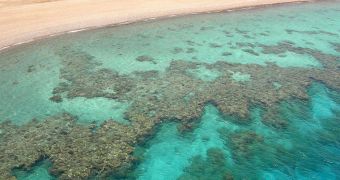In a new scientific study, experts discovered that a clear separation exists between coral reefs that would follow the behavior of algae they are living in symbiosis with, and corals that would not do the same. The finding is very important for determining how the reefs would react to global warming.
Climate change is making life increasingly tougher for coral reefs and the species that depend on these massive organisms for their survival. The reefs are also biodiversity hotspots, home to numerous species, and one of the main constituents of oceanic food webs.
But some of the corals are very likely to follow the chemical signals release by algae living within their community, and this eventually leads to their demise. The difference between the classes of corals that do this and those who don't is a single, “suicide” protein, the new study found.
Algae residing within reefs send out chemical signals at all times. On occasions, they release distress signals meant to indicate that something is wrong. Some of the corals are extremely sensitive to these chemicals, and very likely to overreact when detecting them, Science News reports.
The study was conducted by a collaboration of experts featuring members from New Jersey and Israel. Details of the work will be published in an upcoming issue of the esteemed journal Proceedings of the National Academy of Sciences (PNAS).
The group says that overreacting corals tend to increase the production rate of an executioner protein called caspase. This triggers a cascade of processes that eventually lead to en-masse cellular suicide.
Most of the stress signals are released by algae as the waters become warmer and more acidic. Corals that can survive these processes contain high amounts of this protein from the get-go, and as such have a much higher tolerance of cellular suicide.
This new investigation “adds critical data to help figure out how coral bleaching happens,” explains researcher Stephen Palumbi, who holds an appointment as a marine population biologist at the Stanford University. He was not a part of the new study.
“It’s not practical for people to go out in their boats and sprinkle caspase inhibitors over coral reefs,” says University of North Florida in Jacksonville marine biologist Cliff Ross. But, he adds, the new study will provide biologist with more data on the evolution of reefs.
This will also help them gain a better understanding of how things will evolve as the waters become ever warmer and even more acidic.

 14 DAY TRIAL //
14 DAY TRIAL //